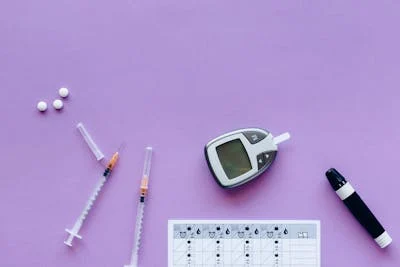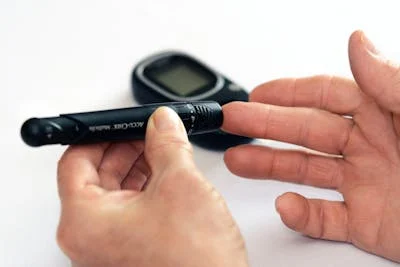Blood Sugar SOS: 10 Tips for Blood Sugar Control!

Table of Contents
Introduction: Blood Sugar Control Solutions: Managing Diabetes Effectively
Managing diabetes necessitates vigilant oversight of blood sugar levels to stave off complications and uphold general well-being. With the right strategies and lifestyle changes, individuals can effectively control their blood sugar levels and lead fulfilling lives. This comprehensive guide explores various solutions for managing blood sugar levels and achieving better diabetes control.
Understanding Blood Sugar Levels: Importance of maintaining stable blood sugar levels
Glucose, commonly referred to as blood sugar, stands as a vital fuel source for the body’s cells, powering various physiological functions. However, maintaining stable blood sugar levels is essential for overall health and well-being. Fluctuations in blood sugar levels can lead to various complications, including diabetic ketoacidosis and hyperglycemia. Understanding the factors influencing blood sugar levels is the first step towards effective management.
Factors Affecting Blood Sugar Levels
Several factors can influence blood sugar levels, including diet, exercise, stress, and medication. By addressing these factors, individuals can better control their blood sugar levels and reduce the risk of complications associated with diabetes.
Diet and Nutrition

The foods we eat have a significant impact on blood sugar levels. Consuming foods with a low glycemic index, such as whole grains, fruits, and vegetables, can help stabilize blood sugar levels. Additionally, focusing on balanced meals and portion control can prevent spikes and crashes in blood sugar levels.
Exercise and Physical Activity

Regular exercise is essential for managing blood sugar levels and improving insulin sensitivity. Both aerobic exercise and strength training can help lower blood sugar levels and improve overall health. Incorporating physical activity into daily routines is key to long-term blood sugar control.
Stress Management
Stress can cause fluctuations in blood sugar levels by triggering the release of stress hormones such as cortisol and adrenaline. Learning effective stress management techniques, such as meditation, deep breathing, and yoga, can help reduce stress levels and promote better blood sugar control.
Medication and Insulin Management
For some individuals with diabetes, medication or insulin therapy may be necessary to control blood sugar levels. It’s essential to follow prescribed treatment plans and monitor blood sugar levels regularly to ensure optimal control.
Monitoring Blood Sugar Levels

Consistent monitoring of blood sugar levels proves pivotal for individuals grappling with diabetes, aiding in the timely detection of any deviations. Various monitoring methods, including blood glucose meters, continuous glucose monitoring systems, and regular medical check-ups, can help track blood sugar levels and detect any fluctuations.
Dietary Solutions for Blood Sugar Control
Adopting a healthy diet is key to managing blood sugar levels effectively. Focus on incorporating low glycemic index foods, balancing meals, and paying attention to portion sizes. Additionally, increasing intake of fiber-rich foods and lean proteins can help stabilize blood sugar levels and promote overall health.
Exercise and Physical Activity for Blood Sugar Management
Engaging in regular physical activity is essential for managing blood sugar levels and reducing the risk of complications associated with diabetes. Strive for a minimum of 30 minutes of moderate-intensity physical activity on most days of the week, encompassing activities like brisk walking, cycling, or swimming.
Stress Management Techniques
Chronic stress can negatively impact blood sugar levels and overall health. Practice stress management techniques such as deep breathing, meditation, and progressive muscle relaxation to reduce stress levels and promote better blood sugar control.
Medication and Insulin Management
Some individuals with diabetes may require medication or insulin therapy to manage their blood sugar levels effectively. It’s essential to take medications as prescribed and monitor blood sugar levels regularly to ensure optimal control and prevent complications.
Importance of Regular Medical Check-ups
Regular medical check-ups are essential for individuals with diabetes to monitor their overall health and detect any potential complications early. During these check-ups, healthcare providers can assess blood sugar levels, monitor blood pressure and cholesterol levels, and adjust treatment plans as necessary.
Lifestyle Modifications for Better Blood Sugar Control
In addition to diet and exercise, certain lifestyle modifications can help improve blood sugar control and overall health. Avoid smoking and limit alcohol consumption, maintain a healthy weight, and stay hydrated by drinking plenty of water throughout the day.
Support Systems for Diabetic Patients
Living with diabetes can be challenging, but having a strong support system in place can make a significant difference. Seek support from family, friends, and healthcare professionals, and consider joining a diabetes support group for additional encouragement and guidance.
Myth Busting: Common Misconceptions about Blood Sugar Control
Misinformation about diabetes and blood sugar control abounds, leading to confusion and potentially harmful decisions. Dispelling these myths is crucial for effectively managing the condition and promoting overall health. One common misconception is that consuming excessive sugar directly causes diabetes. While a high-sugar diet can contribute to weight gain and increase the risk of type 2 diabetes, it’s not the sole cause. Genetic factors, lifestyle choices, and other health conditions also play significant roles.
Another prevalent myth is that people with diabetes can’t enjoy sweets or sugary foods at all. While moderation is key, individuals with diabetes can still indulge in treats occasionally as part of a balanced diet. Additionally, there’s a misconception that only overweight individuals develop diabetes. While being overweight or obese does increase the risk, diabetes can affect people of any body type.
Furthermore, some believe that insulin is a cure for diabetes. In reality, insulin is a vital treatment for managing blood sugar levels, but it’s not a cure. It’s crucial to understand that diabetes requires comprehensive management, including diet, exercise, medication, and regular monitoring.
Separating fact from fiction is essential for making informed decisions about blood sugar control. Relying on evidence-based information and consulting with healthcare professionals can help individuals effectively manage their condition and lead healthier lives.
Real-Life Success Stories
Many individuals with diabetes have successfully managed their blood sugar levels and improved their overall health through lifestyle changes and medication. These inspiring stories serve as a reminder that effective blood sugar control is achievable with dedication and perseverance.
Future Trends in Blood Sugar Control
The landscape of blood sugar control for individuals with diabetes is continuously evolving with advancements in technology and treatment options. These innovations hold promise for enhancing management strategies and ultimately improving the quality of life for those living with diabetes.
One notable advancement is the development of continuous glucose monitoring (CGM) systems. Unlike traditional glucose monitoring methods that require periodic fingerstick tests, CGM systems provide real-time data on blood sugar levels throughout the day. This technology allows individuals to make more informed decisions about their diet, exercise, and medication, leading to better blood sugar control and fewer fluctuations.
Another groundbreaking development is artificial pancreas technology, also known as closed-loop systems. These systems automate the delivery of insulin based on continuous glucose monitoring data, mimicking the function of a healthy pancreas. By providing precise insulin dosing and reducing the risk of hypoglycemia, artificial pancreas technology offers a more seamless and effective approach to blood sugar management.
Additionally, advancements in wearable devices and smartphone applications enable individuals to track their blood sugar levels and manage their condition more conveniently. These tools empower individuals to take a proactive role in their diabetes management, fostering greater adherence to treatment plans and promoting better health outcomes.
Overall, the future of blood sugar control looks promising with the integration of technology and innovative treatment options. As these advancements continue to evolve, individuals with diabetes can look forward to improved management strategies, enhanced quality of life, and greater peace of mind in managing their condition.
Conclusion
Effective blood sugar control is essential for individuals with diabetes to prevent complications and lead healthy, fulfilling lives. By addressing diet, exercise, stress, medication, and lifestyle factors, individuals can achieve better blood sugar control and improve their overall health and well-being.
Frequently Asked Questions (FAQs)
How often should I monitor my blood sugar levels?
It’s advisable to routinely check your blood sugar levels as per the guidance of your healthcare provider, ensuring proactive management of your condition. This may vary depending on your individual health needs and treatment plan.
Are there any specific foods I should avoid to control my blood sugar levels?
While there’s no one-size-fits-all answer, it’s generally advisable to limit foods high in refined sugars and carbohydrates, as they can cause spikes in blood sugar levels. Opt for whole grains, fruits, vegetables, and lean proteins instead.
Can exercise help lower blood sugar levels even if I don't have diabetes?
Yes, regular exercise can help improve insulin sensitivity and lower blood sugar levels, even in individuals without diabetes. It’s an essential component of a healthy lifestyle for everyone.
What should I do if I experience a sudden drop in my blood sugar levels?
If you experience symptoms of low blood sugar, such as dizziness, sweating, or confusion, it’s essential to consume a fast-acting source of carbohydrates, such as fruit juice or glucose tablets, to raise your blood sugar levels quickly. Be sure to follow up with a balanced meal or snack to prevent another drop.
How can I find emotional support for managing my diabetes?
Seeking support from friends, family, and healthcare professionals is crucial for managing diabetes effectively. Additionally, joining a diabetes support group or seeking counseling can provide valuable emotional support and guidance.
What function does insulin serve in the regulation of blood sugar?
Insulin, a hormone manufactured by the pancreas, plays a crucial role in maintaining blood sugar equilibrium by facilitating the absorption of glucose into cells from the bloodstream. In individuals with diabetes, either the pancreas produces insufficient insulin or the body’s cells become resistant to insulin, leading to high blood sugar levels.
Are there any natural remedies or supplements that can help with blood sugar control?
Some natural remedies and supplements, such as cinnamon, chromium, and alpha-lipoic acid, may have modest effects on blood sugar control. However, it’s essential to consult with a healthcare provider before using any supplements, as they may interact with medications or have adverse effects.
How does stress affect blood sugar levels?
Stress can cause the body to release hormones like cortisol and adrenaline, which can lead to increases in blood sugar levels. Chronic stress may also contribute to insulin resistance, making it more challenging to control blood sugar levels effectively.
Can blood sugar control affect my energy levels throughout the day?
Yes, maintaining stable blood sugar levels is crucial for sustained energy levels throughout the day. Fluctuations in blood sugar can lead to feelings of fatigue and lethargy, while stable blood sugar levels can help maintain consistent energy levels.
What are the signs of high blood sugar levels?
Symptoms of high blood sugar levels (hyperglycemia) may include increased thirst, frequent urination, blurred vision, fatigue, and slow wound healing. If you experience these symptoms, it’s essential to check your blood sugar levels and consult with a healthcare provider.
How can I prevent blood sugar spikes after meals?
To prevent blood sugar spikes after meals, focus on consuming balanced meals that include a combination of carbohydrates, protein, and healthy fats. Avoid high-glycemic index foods and refined sugars, and consider spacing out your meals throughout the day.
Does alcohol consumption affect blood sugar control?
Yes, alcohol consumption can affect blood sugar levels, depending on factors such as the type and amount of alcohol consumed and whether it’s consumed with food. Moderate alcohol consumption may have minimal effects on blood sugar levels, but excessive consumption can lead to fluctuations and should be avoided.
Can certain medications cause fluctuations in blood sugar levels?
Yes, some medications, such as corticosteroids, beta-blockers, and certain antidepressants, can affect blood sugar levels and insulin sensitivity. It’s essential to consult with a healthcare provider about the potential effects of medications on blood sugar control, especially if you have diabetes.
What are the benefits of maintaining stable blood sugar levels for overall health?
Sustaining consistent blood sugar levels stands as a cornerstone of overall health and vitality. It can help reduce the risk of complications associated with diabetes, such as heart disease, kidney disease, nerve damage, and vision problems.
How can I incorporate mindfulness into my blood sugar management routine?
Mindfulness practices, such as mindful eating and meditation, can help improve awareness of hunger cues, reduce stress, and promote better blood sugar control. Taking time to focus on the present moment and practice gratitude can also enhance overall well-being.
Can I still enjoy desserts and sweets while managing my blood sugar levels?
Yes, individuals with diabetes can enjoy desserts and sweets in moderation as part of a balanced meal plan. It’s essential to be mindful of portion sizes and choose options lower in sugar and higher in fiber when possible.
Does sleep quality affect blood sugar control?
Yes, inadequate sleep or poor sleep quality can disrupt hormone levels and lead to insulin resistance, making it more challenging to control blood sugar levels. Strive to attain between seven to nine hours of uninterrupted sleep nightly to foster optimal control over blood sugar levels.
What role does hydration play in blood sugar management?
Staying hydrated is important for overall health and can help support stable blood sugar levels. Drinking water throughout the day can help prevent dehydration, which can contribute to fluctuations in blood sugar levels.
How does smoking affect blood sugar control?
Smoking can increase the risk of insulin resistance and lead to higher blood sugar levels. Additionally, smoking is associated with various health complications, including cardiovascular disease, which can further impact blood sugar control.
Are there any specific fruits that are beneficial for blood sugar control?
Some fruits, such as berries, apples, and citrus fruits, are lower in sugar and higher in fiber, making them good choices for individuals looking to control their blood sugar levels. It’s essential to monitor portion sizes and consider the overall carbohydrate content of fruits when incorporating them into your diet.
Read More From Our Blogs...

10 Beauty Benefits of Massage Therapy
10 Beauty Benefits of Massage Therapy Unlocking the Beauty Benefits of Massage Therapy: Enhance Your Glow Naturally Massage therapy isn’t just a luxurious indulgence; it’s

High Blood Pressure and Epileptic Seizures
Unlocking the Connection Between High Blood Pressure and Epileptic Seizures Introduction: High Blood Pressure and Epileptic Seizures Epilepsy, a neurological disorder characterized by recurrent seizures,

Can High Blood Pressure Cause Seizures?
Can High Blood Pressure Cause Seizures? Introduction: Blood Sugar Control Solutions: Managing Diabetes Effectively High blood pressure, medically known as hypertension, is a common condition

Blood Sugar SOS: 10 Tips for Blood Sugar Control!
Blood Sugar SOS: 10 Tips for Blood Sugar Control! Table of Contents Introduction: Blood Sugar Control Solutions: Managing Diabetes Effectively Managing diabetes necessitates vigilant oversight

The Secret Weapon Against Diabetes: Meet Amiclear!
Discover the Secret Weapon Against Diabetes: Meet Amiclear! Introduction Diabetes presents as a persistent health condition impacting millions globally, distinguished by heightened levels of glucose

10 Basics of Wealth Management: Your Pathway to Financial Success.
10 Basics of Wealth Management: Pathway to Financial Success Introduction: 10 Basics of Wealth Management – Wealth Management Demystified Welcome to the world of wealth